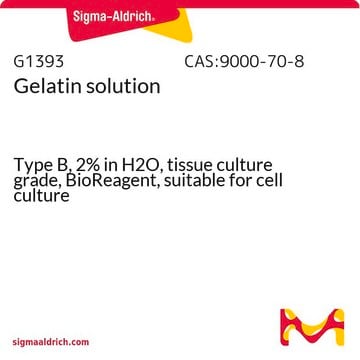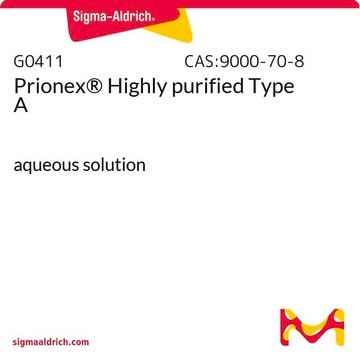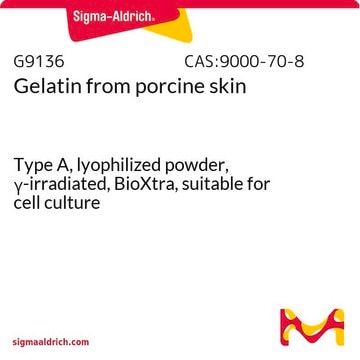924504
Gelatin Type A
300 Bloom, Low endotoxin
Szinonimák:
300 Bloom, 3D Bioprinting, GelMA, Gelatin, Gelatin methacrylamide, Gelatin methacrylate, Gelatin methacryloyl
Bejelentkezésa Szervezeti és Szerződéses árazás megtekintéséhez
Összes fotó(1)
About This Item
UNSPSC kód:
12352201
NACRES:
NA.23
Javasolt termékek
Minőségi szint
form
powder or chunks
szennyeződések
<10 CFU/g Bioburden
<125 EU/g Endotoxin
szín
white to pale yellow
tárolási hőmérséklet
2-8°C
Related Categories
Alkalmazás
Low endotoxin gelatin, type A is sterile filtrated through 0.2 μm sterile filter, and lyopholized for use in biomedical applications.
Gelatin is widely used for tissue engineering and 3D bioprinting. Gelatin is derived from natural extracellular matrix (ECM) components. Due to its low cost, abundance, and retention of natural cell binding motifs, gelatin has become a highly sought material for tissue engineering applications. Gelatin solution has thermoreversible gelling property which enables synthesis of biocompatible and biodegradable hydrogels and promote cell adhesion, spreading, and proliferation.
Gelatin is widely used for tissue engineering and 3D bioprinting. Gelatin is derived from natural extracellular matrix (ECM) components. Due to its low cost, abundance, and retention of natural cell binding motifs, gelatin has become a highly sought material for tissue engineering applications. Gelatin solution has thermoreversible gelling property which enables synthesis of biocompatible and biodegradable hydrogels and promote cell adhesion, spreading, and proliferation.
Kiszerelés
500 mg in glass bottle
Tárolási osztály kódja
11 - Combustible Solids
WGK
WGK 3
Lobbanási pont (F)
Not applicable
Lobbanási pont (C)
Not applicable
Válasszon a legfrissebb verziók közül:
Analitikai tanúsítványok (COA)
Lot/Batch Number
Nem találja a megfelelő verziót?
Ha egy adott verzióra van szüksége, a tétel- vagy cikkszám alapján rákereshet egy adott tanúsítványra.
Már rendelkezik ezzel a termékkel?
Az Ön által nemrégiben megvásárolt termékekre vonatkozó dokumentumokat a Dokumentumtárban találja.
J M Harlan et al.
Laboratory investigation; a journal of technical methods and pathology, 48(3), 269-274 (1983-03-01)
Lipopolysaccharide (LPS) produced time- and dose-dependent bovine endothelial cell injury in vitro that was manifested initially by cell detachment from culture substrate with subsequent cell lysis. Bovine endothelial cell injury was observed with LPS derived from Salmonella minnesota R595, a
E J Ziegler et al.
The New England journal of medicine, 307(20), 1225-1230 (1982-11-11)
In an effort to decrease deaths from gram-negative bacteremia and endotoxin shock, we treated bacteremic patients with human antiserum to endotoxin (lipopolysaccharide) core. Antiserum was prepared by vaccinating healthy men with heat-killed Escherichia coli J5; this mutant lacks lipopolysaccharide oligosaccharide
K W Brunson et al.
Journal of supramolecular structure, 9(2), 231-242 (1978-01-01)
Chinese hamster ovary (CHO . K1 . PRO) cell growth was inhibited by addition of a gram-negative bacterial lipopolysaccharide (LPS) to the cell culture medium. Growth inhibition began after three or four days of incubation, was dose-dependent up to a
T Kirikae et al.
International journal of immunopharmacology, 19(5), 255-262 (1997-05-01)
Trace amounts of endotoxin (lipopolysaccharide: LPS) are assumed to contaminate commercially available fetal bovine serum (FBS) for tissue or cell culture during the manufacturing process. We examined how cultured cells were affected by the endotoxin and how much endotoxin was
J G Brock-Utne et al.
Anaesthesia and intensive care, 17(1), 49-55 (1989-02-01)
Endotoxins (lipopolysaccharides, LPS) are potent bacterial poisons always present within the intestines in considerable amounts. Several pathophysiological conditions such as hypovolaemia, hypoxia, intestinal ischaemia, burns and radiation lead to a breakdown in the barrier and depending upon the extent of
Tudóscsoportunk valamennyi kutatási területen rendelkezik tapasztalattal, beleértve az élettudományt, az anyagtudományt, a kémiai szintézist, a kromatográfiát, az analitikát és még sok más területet.
Lépjen kapcsolatba a szaktanácsadással








